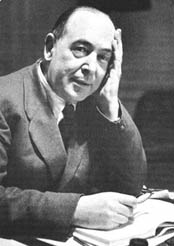 For the past few days, I was at a cabin at the Oregon coast to do some extensive, uninterrupted writing on the Courageous novel. Related to writing, my friend Justin Taylor posted this a few months ago on his excellent blog. Loving Lewis as I do, I've heard it before, but part of it not for years.
For the past few days, I was at a cabin at the Oregon coast to do some extensive, uninterrupted writing on the Courageous novel. Related to writing, my friend Justin Taylor posted this a few months ago on his excellent blog. Loving Lewis as I do, I've heard it before, but part of it not for years.
Six months before C. S. Lewis died, in 1963, Sherwood Wirt (who I met at a writer's conference thirty years ago and deeply appreciated) asked Lewis this question: “How would you suggest a young Christian writer go about developing a style?”
Lewis responded:
The way for a person to develop a style is (a) to know exactly what he wants to say, and (b) to be sure he is saying exactly that.
The reader, we must remember, does not start by knowing what we mean. If our words are ambiguous, our meaning will escape him.
I sometimes think that writing is like driving sheep down a road. If there is any gate open to the left or the right the reader will most certainly go into it.
In 1956, Lewis responded to a letter from an American girl named Joan with advice on writing:
1. Always try to use the language so as to make quite clear what you mean and make sure your sentence couldn’t mean anything else.
2. Always prefer the plain direct word to the long, vague one. Don’t implement promises, but keep them.
3. Never use abstract nouns when concrete ones will do. If you mean “More people died” don’t say “Mortality rose.”
4. In writing. Don’t use adjectives which merely tell us how you want us to feel about the things you are describing. I mean, instead of telling us the thing is “terrible,” describe it so that we’ll be terrified. Don’t say it was “delightful”; make us say “delightful” when we’ve read the description. You see, all those words (horrifying, wonderful, hideous, exquisite) are only like saying to your readers “Please, will you do my job for me.”
5. Don’t use words too big for the subject. Don’t say “infinitely” when you mean “very”; otherwise you’ll have no word left when you want to talk about something really infinite.
Lyle W. Dorsett and Marjorie Lamp Mead, editors, C. S. Lewis' Letters to Children, (Simon and Schuster, 1996), 64.
Photo by Glenn Carstens-Peters on Unsplash




